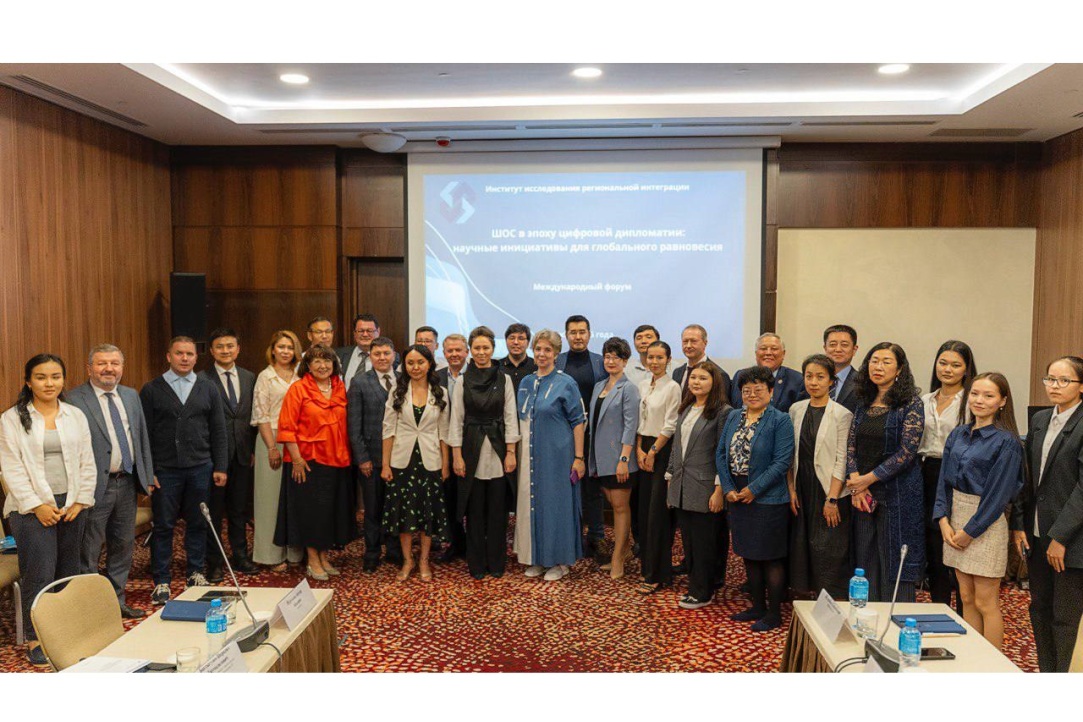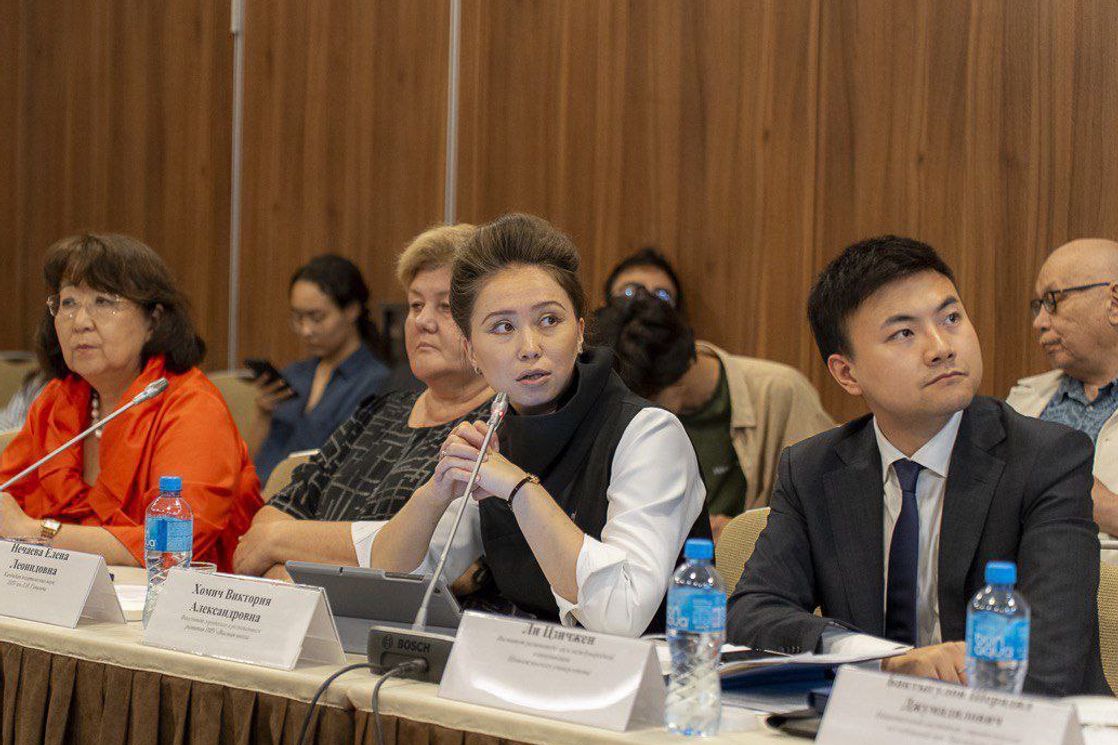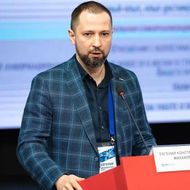HSE University Strengthens Ties with Central Asia

Experts from the HSE Faculty of Urban and Regional Development (FURD) took part in the international forum ‘The SCO in the Era of Digital Diplomacy: Scientific Initiatives for Global Balance.’ The event, held in Astana, was organised by the Eurasian Association for International Studies and the Institute for the Study of Regional Integration (Kazakhstan).
The forum brought together leading experts on integration processes across the Eurasian space, including specialists from SCO member states—China, Uzbekistan, Kyrgyzstan, Kazakhstan, and Russia—as well as from Turkey, an SCO observer state.
Victoria Khomich, Deputy Dean for International Affairs at the HSE Faculty of Urban and Regional Development and a forum participant, highlighted the key challenges facing the region’s countries: the establishment of unified standards and approaches to information security, the management of urbanisation processes and city development, and scientific, technological, and educational integration.

‘We presented the main directions of international cooperation in urban studies. Following the discussions, certain topics emerged as particularly relevant for Central Asia: master planning, socio-economic development strategies, transport planning, and the smart city concept,’ commented Victoria Khomich.

Evgeny Mikhaylenko
Previously, Dean of the HSE Faculty of Urban and Regional Development Evgeny Mikhaylenko emphasised that international cooperation is a vital tool for addressing complex urban and regional development challenges. ‘Participation in international forums and partnership projects enables us to analyse emerging challenges, assess achievements, and shape future plans, as well as generate ideas for academic research,’ he noted.
Experts from neighbouring countries particularly praised the faculty’s high level of expertise and its practice-oriented approach to dialogue.
Notably, following the event, representatives of relevant institutions from SCO countries—primarily colleagues from Central Asia—expressed strong interest in FURD’s professional development programmes, as well as in the potential for designing customised continuing education programmes for municipal officials from Central Asian countries.
The parties agreed to continue developing cooperation in academic, research, and project-based areas.
Such events are especially significant in the run-up to the SCO’s 25th anniversary in 2026. After a quarter of a century of active integration efforts across the Eurasian region—building trust, strengthening humanitarian ties, establishing legal frameworks, and creating tools to enhance economic effectiveness—there is a pressing need for a joint shift towards a more fundamental and practice-based level of cooperation, in which cities may play a central role.
See also:
Larger Groups of Students Use AI More Effectively in Learning
Researchers at the Institute of Education and the Faculty of Economic Sciences at HSE University have studied what factors determine the success of student group projects when they are completed with the help of artificial intelligence (AI). Their findings suggest that, in addition to the knowledge level of the team members, the size of the group also plays a significant role—the larger it is, the more efficient the process becomes. The study was published in Innovations in Education and Teaching International.
Designing an Accurate Reading Skills Test: Why Parallel Texts are Important in Dyslexia Diagnosis
Researchers from the HSE Centre for Language and Brain have developed a tool for accurately assessing reading skills in adults with reading impairments. It can be used, for instance, before and after sessions with a language therapist. The tool includes two texts that differ in content but are equal in complexity: participants were observed to read them at the same speed, make a similar number of errors, and understand the content to the same degree. Such parallel texts will enable more accurate diagnosis of dyslexia and better monitoring of the effectiveness of interventions aimed at addressing it. The paper has been published in Educational Studies.
Intellectual Capital in the Face of Shocks: Russia and Iran Explore Internationalisation
In today's issue of Schola, Mariya Molodchik, Senior Research Fellow at the International Laboratory of Intangible-Driven Economy and Professor at the School of Economics and Finance at HSE University’s Campus in Perm, discusses a joint project with Iran University of Science and Technology, titled 'Internationalization of Companies from Developing Countries: The Role of Intellectual Resources in Response to Exogenous Shocks.'
HSE Researchers Introduce Novel Symmetry-Aware Neural Network Architecture
Researchers at the HSE Laboratory for Geometric Algebra and Applications have developed a new neural network architecture that can accelerate and streamline data analysis in physics, biology, and engineering. The scientists presented their solution on July 16 in Vancouver at ICML 2025, one of the world's leading conferences on machine learning. Both the paper and the source code are publicly available.
Students from HSE and Other Universities Carry Out Research Expedition at New Chersonesos
As part of the Rediscovering Russia student expedition programme, HSE University organised a research trip under the framework of the School for Young Humanities Scholars to the New Chersonesos museum and church complex in Sevastopol. The results of this expedition will form the basis for proposals on educational projects aimed at shaping young people’s historical memory of the role of Chersonesos, Crimea, and the Byzantine legacy in the history of Russian culture and statehood.
HSE Researchers Determine Frequency of Genetic Mutations in People with Pulmonary Hypertension
For the first time in Russia, a team of scientists and clinicians has conducted a large-scale genetic study of patients with pulmonary arterial hypertension. The team, which included researchers from the International Laboratory of Bioinformatics at the HSE Faculty of Computer Science, analysed the genomes of over a hundred patients and found that approximately one in ten carried pathogenic mutations in the BMPR2 gene, which is responsible for vascular growth. Three of these mutations were described for the first time. The study has been published in Respiratory Research.
First Caucasus School on Experimental Research and Cognitive Sciences Takes Places in Adygea
On September 17–20, 2025, the First Caucasus School on Experimental Research and Cognitive Sciences took place at the Gornaya Legenda venue of Adyghe State University (ASU). The event was organised by the ASU Experimental Linguistics Laboratory, the HSE Centre for Language and Brain, and the HSE Centre for Sociocultural and Ethnolinguistic Studies. The school brought together over 50 participants—students, doctoral candidates, and early-career researchers from across Russia, along with lecturers and speakers from France, Serbia, China, Turkey, Kazakhstan, and Uzbekistan.
HSE Scientists Reveal How Disrupted Brain Connectivity Affects Cognitive and Social Behaviour in Children with Autism
An international team of scientists, including researchers from the HSE Centre for Language and Brain, has for the first time studied the connectivity between the brain's sensorimotor and cognitive control networks in children with autism. Using fMRI data, the researchers found that connections within the cognitive control network (responsible for attention and inhibitory control) are weakened, while connections between this network and the sensorimotor network (responsible for movement and sensory processing) are, by contrast, excessively strong. These features manifest as difficulties in social interaction and behavioural regulation in children. The study has been published in Brain Imaging and Behavior.
Scientists Develop New Method to Detect Motor Disorders Using 3D Objects
Researchers at HSE University have developed a new methodological approach to studying motor planning and execution. By using 3D-printed objects and an infrared tracking system, they demonstrated that the brain initiates the planning process even before movement begins. This approach may eventually aid in the assessment and treatment of patients with neurodegenerative diseases such as Parkinson’s. The paper has been published in Frontiers in Human Neuroscience.
Global AI Trends Discussed at International Foresight Workshop at HSE University
At an international foresight workshop on artificial intelligence held at HSE University, Russian and foreign scholars discussed the trends and challenges arising from the rapid development of AI.


